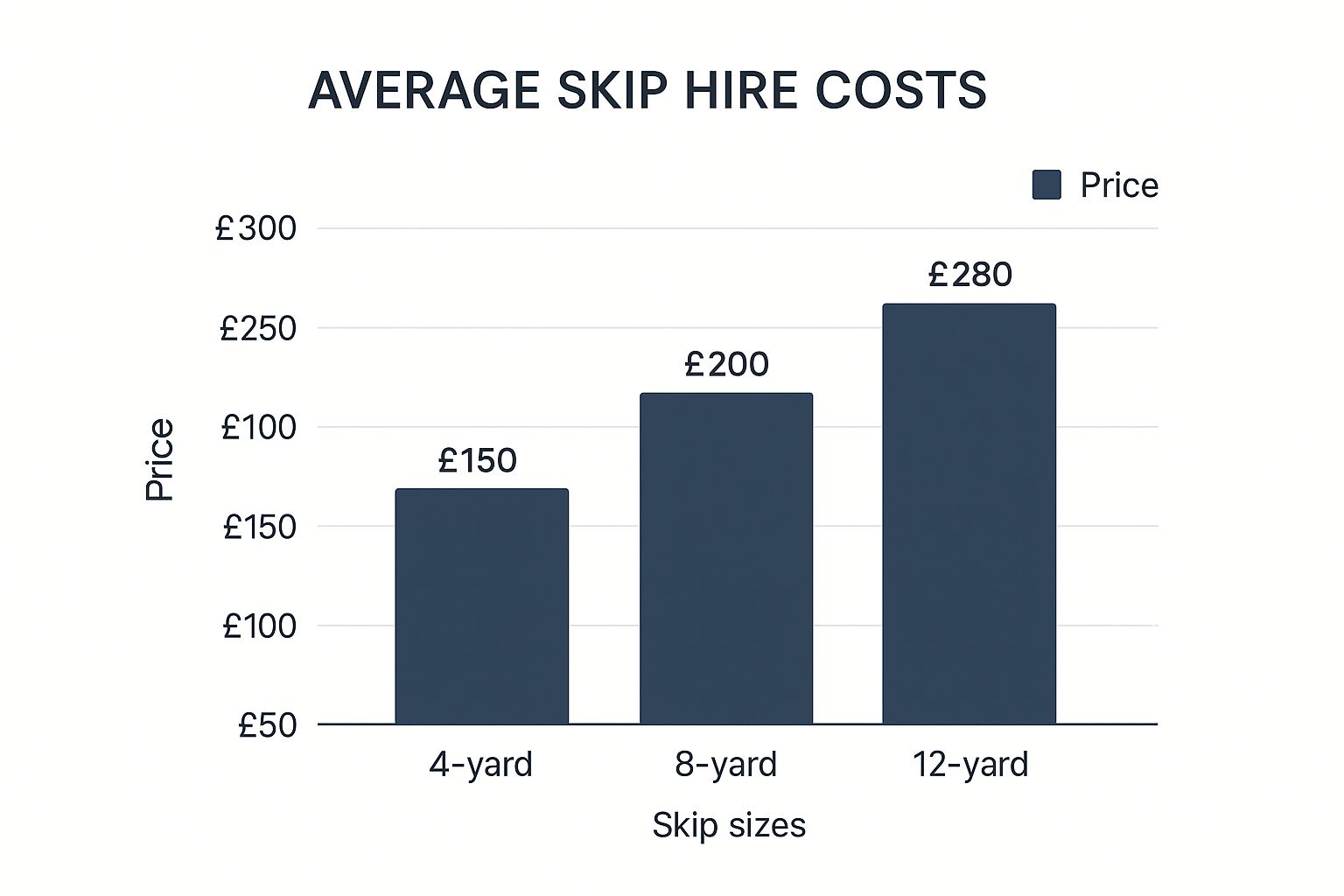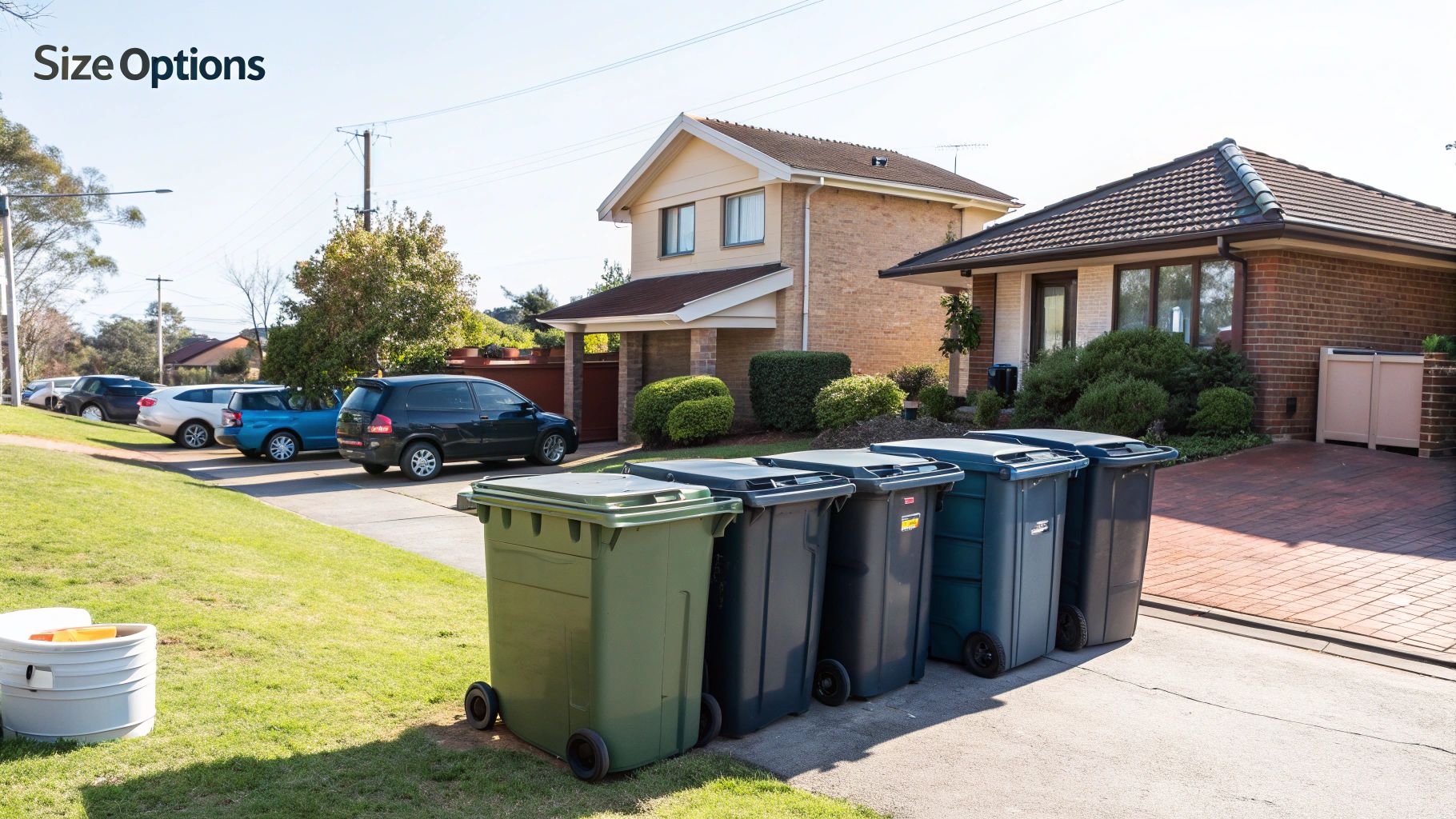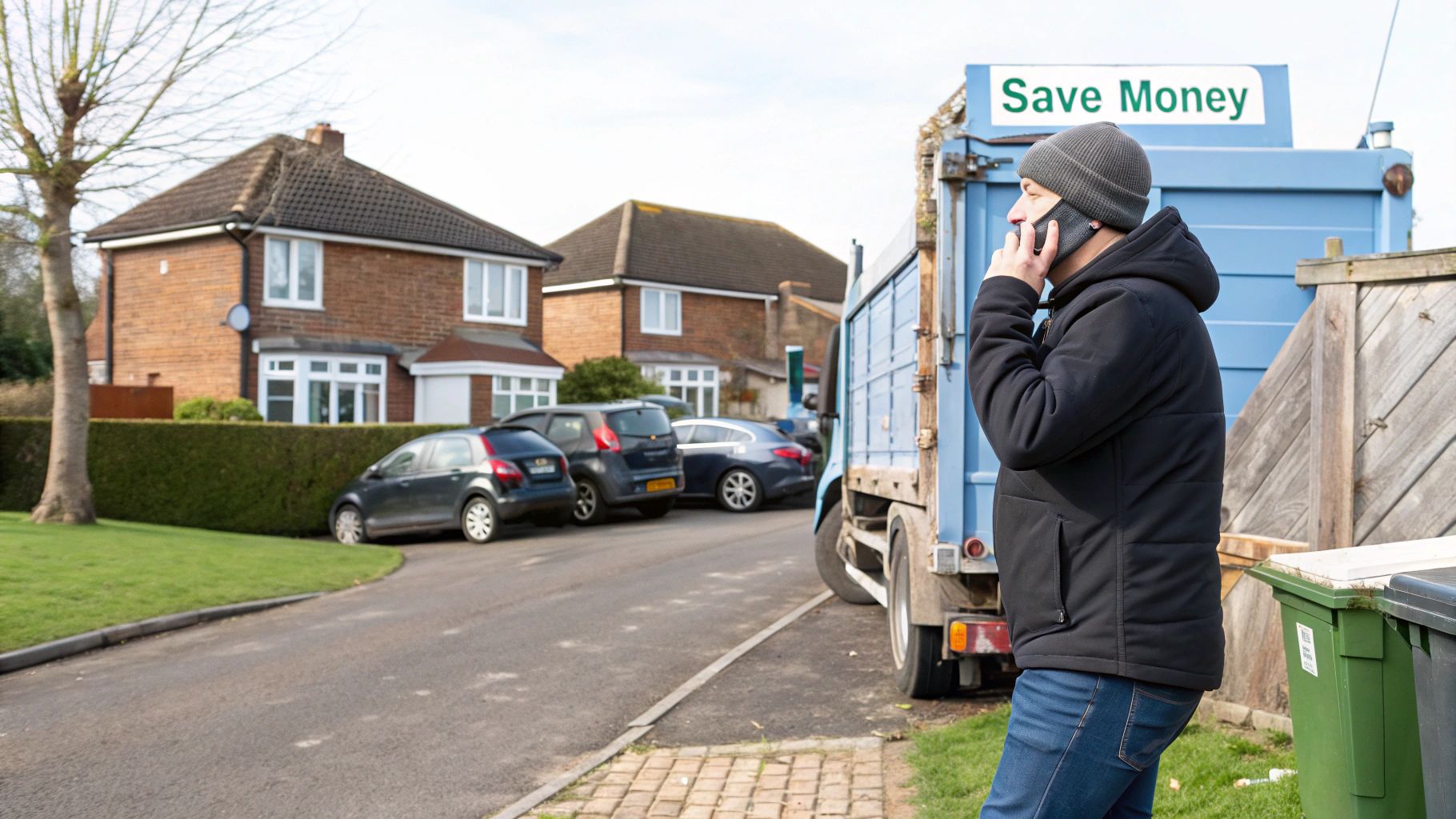Skip Hire Prices Near Me – A Practical Guide

Skip Hire Prices Near Me A Practical Guide
So, you’re searching for “skip hire prices near me” and trying to get a straight answer. Let’s cut through the noise. For a standard 8-yard builder’s skip, you’re generally looking at a price tag somewhere between £160 and £370.
Of course, that’s a pretty wide range. The final price you pay will always come down to your specific postcode, the exact size you need, and what you’re planning to throw in it.
Your Guide to Local Skip Hire Prices
Let’s get right to it. You need a skip, and you want to know what it’s going to cost. While the final figure always depends on your exact location, this guide will give you a solid ballpark to start with.
Think of it as your first step in budgeting. The price is really a mix of three key things: where you are, how big the skip is, and the type of waste you’re getting rid of. Getting your head around these factors will help you estimate the cost, whether you’re just clearing out the garden or in the middle of a massive renovation.
For a deeper dive into how these costs add up, check out our full guide on how much it is to hire a skip.
Average UK Skip Hire Prices
To give you a clearer picture, this chart shows you the typical cost for three of the most popular skip sizes right across the UK.

As you can see, the price climbs steeply with the size. The 12-yard skip can be almost double the price of the 4-yard option, which really shows how important it is to pick the right size from the start to avoid paying for space you don’t need.
A Closer Look at the Numbers
The cost of hiring a skip varies massively, and it’s all tied to how much waste you need to shift.
- For those smaller jobs, a 2-3 yard mini skip is a great shout. They usually cost between £60 and £130 and can hold about 30 bin bags worth of rubbish.
- Moving up, a 4-5 yard skip will set you back somewhere between £100 and £250.
- The ever-popular 6-yard builder’s skip typically ranges from £120 to £300.
- An 8-yard skip, which can take around 80 bin bags, costs £160-£370.
- For the really huge projects, a massive 40-yard roll-on roll-off skip could cost up to £800.
Pro Tip: The single biggest mistake people make is ordering a skip that’s too small. The cost of hiring a second one almost always wipes out any savings you thought you were making.
Ultimately, the only way to get a precise price is to get a quote from a local company. But to help you start your planning, here’s a quick reference table.
Average UK Skip Hire Prices by Size
Here’s a quick reference table showing the typical cost range for the most common skip sizes. It’s perfect for getting a rough idea of your budget before you start making calls.
| Skip Size (Cubic Yards) | Typical Capacity (Bin Bags) | Average Price Range (£) |
|---|---|---|
| 4 Yard (Mini) | 30 – 40 | £120 – £180 |
| 6 Yard (Small Builder’s) | 50 – 60 | £180 – £260 |
| 8 Yard (Large Builder’s) | 70 – 80 | £220 – £320 |
| 12 Yard (Maxi) | 100 – 120 | £260 – £400 |
This table makes it easy to connect the skip size you might need with its capacity and the price you can expect to pay. Use it as a starting point when you’re figuring out the scope of your project.
Why Your Postcode Changes the Price
Ever wondered why the exact same skip can have a wildly different price tag in London compared to, say, Leeds? It’s not just a number plucked from thin air; your postcode is one of the biggest factors that will shape the final quote you receive.
Think of it like buying a cup of coffee. You know it’s going to cost you more in a busy city centre café than it will in a quiet village shop. Skip hire works on exactly the same principle. That’s why just searching for “skip hire prices near me” is so important, because relying on a national average can be seriously misleading.
Regional Price Variations Across the UK
The price gap between different parts of the country isn’t just a few quid here or there—it can be massive. For a start, there’s a clear North-South divide.
In 2025, you might find a 2-3 yard mini skip for around £65-£110 in parts of northern England. But for that very same skip down south, you could be looking at £90-£150. And if you’re in London? Expect that price to jump again to £135-£175. That means London prices can be nearly double what you’d pay up north for the identical product.
This trend continues as you go up in size. An 8-yard builder’s skip is a really popular choice for renovation jobs. In the north, you might pay somewhere between £250-£320, but that figure could easily climb past £450 in the capital.
Key Takeaway: A huge chunk of the cost is made up of local council charges for skip permits, waste disposal “gate fees,” and local landfill taxes. All of these get passed on to you, the customer, and they vary dramatically from one local authority to another.
What Drives Local Price Differences
Beyond the broad regional differences, there are a few other local factors that create a unique pricing bubble right in your immediate area.
- Local Council Permit Fees: If your skip has to sit on a public road, you’ll need a permit from your local council. This fee isn’t standard across the country; it can be as little as £15 in one area and over £100 in another, adding a hefty chunk to your bill.
- Competition Levels: Simple supply and demand. An area with lots of skip hire companies competing for your business will naturally have better prices. If there are only one or two providers serving your town, they don’t have the same pressure to keep their rates low.
- Proximity to Waste Facilities: How far does the lorry have to travel to tip your waste? This is a major factor. The further the skip depot is from the nearest recycling centre or landfill, the more you’ll end up paying to cover their fuel and time.
Just as your postcode dictates skip hire fees, it’s interesting to see how geography influences service costs for other things, like moving house over a long distance. At the end of the day, the only way to know for sure what you’ll pay is to get a quote based on your exact postcode.
How to Choose the Right Skip Size

Picking the right skip size is a bit like a Goldilocks story. Go too big, and you’re paying for empty space you didn’t need. Go too small, and you’ll have the headache and extra cost of hiring a second one. Getting it ‘just right’ is the secret to getting real value for your money.
So, how do you do it? The best trick is to try and visualise your waste. Instead of just guessing, think of it in terms of something you know, like how many standard black bin bags it would fill. This simple technique makes the whole idea of “cubic yards” feel a lot more real and helps you make a much smarter choice.
Matching the Skip to Your Project
It’s obvious when you think about it: different jobs create different amounts of rubbish. A small garden tidy-up just won’t generate the same volume of waste as a full kitchen strip-out. Nailing this connection is your first step to choosing the most cost-effective skip.
Here’s a quick look at the most common skip sizes and what they’re usually hired for:
- Mini Skips (2-4 Yards): These are the go-to for small-scale jobs around the house. Think of a weekend spent clearing the garden, decluttering a spare room, or digging out a bit of old soil. They’ll comfortably hold between 20-40 bin bags.
- Midi Skips (4-6 Yards): A very popular choice for those slightly bigger domestic projects, like ripping out an old bathroom or clearing a small kitchen. A 6-yard skip is often called a “small builder’s skip” and can handle around 50-60 bin bags.
- Builder’s Skips (8 Yards): This is the classic workhorse of the skip world. It’s the most common size you’ll see on building sites and is perfect for large home renovations. An 8-yard skip takes on bulky items with ease and holds roughly 70-80 bin bags’ worth of waste.
A word of warning: it’s incredibly easy to underestimate how much waste you have. Things like old furniture or broken-down kitchen cabinets take up way more room than you’d expect once they’re in a skip. If you’re ever in doubt, it’s always better to go one size up.
Which Skip Size Do You Need?
To make things even easier, the table below lines up common skip sizes with typical projects, giving you a clear guide to match your job to the right container. If you need an even more in-depth look, our guide on what size skip you might need has all the extra details.
| Skip Size | Best For (Project Type) | Approximate Capacity | Key Advantage |
|---|---|---|---|
| 4 Yard (Mini) | Small garden clear-outs, single room decluttering | 30-40 bin bags | Fits easily on most driveways and is budget-friendly. |
| 6 Yard (Midi) | Kitchen or bathroom renovations, large garden projects | 50-60 bin bags | A versatile mid-range option for mixed light and heavy waste. |
| 8 Yard (Builder’s) | Major renovations, construction site waste, full house clearances | 70-80 bin bags | Ideal for bulky items and large volumes of construction debris. |
Ultimately, spending just a few minutes thinking about the amount of rubbish you’re getting rid of will have a direct impact on the final price you pay. A well-chosen skip is an efficient skip.
The Hidden Costs of Hiring a Skip

When you’re searching for “skip hire prices near me,” it’s all too easy to just grab the cheapest quote you see. But hold on a second – that initial number isn’t always the final figure you’ll pay. A whole host of extra fees can creep onto your invoice if you’re not careful, quickly turning what looked like a bargain into a bit of a headache.
Knowing about these potential extra charges before you book is the secret to budgeting properly. It puts you in the driver’s seat, allowing you to ask the right questions and get a truly all-in price. It’s a common issue across many industries, and it always pays for consumers to do their homework when it comes to uncovering the real cost of a service to avoid any nasty surprises.
Common Extra Charges to Watch For
The most common culprit is the skip permit. If you don’t have a private driveway or garden to place the skip, it’ll have to go on a public road or pavement. To do this legally, you need a permit from your local council. The skip company will sort all this out for you, but they’ll pass the cost—which can be anywhere from £15 to over £100—straight onto your bill.
Another regular extra charge is for specific types of waste. Skips are fantastic for most general rubbish, but some items need special handling and disposal, which means they cost more to get rid of.
- Mattresses: These are notoriously tricky to recycle, so most companies add a surcharge.
- Plasterboard: By law, this has to be disposed of separately from all other waste.
- Tyres: You can’t just send tyres to landfill; they need to be recycled by specialists.
- Fridges and Freezers: These contain hazardous coolants that must be removed safely by a professional.
Always be upfront about these items when you’re booking. It’s the only way to get a price that won’t change later.
Important Note: Don’t be tempted to hide these forbidden items at the bottom of the skip. It’s a risky game. If the driver spots them, the company can refuse to collect the skip or hit you with some pretty hefty penalty fees for incorrect disposal.
Penalties for Overfilling Your Skip
Finally, you need to respect the fill line. Every single skip has a maximum fill level, which is usually a clear line painted on the side. Overfilling isn’t a small thing – it’s a major safety hazard. An overloaded skip is actually illegal to transport on public roads.
If your skip is piled too high, the driver will probably refuse to take it until you’ve levelled it off. This often results in a “wasted journey” charge, meaning you pay for the failed collection attempt. It can also throw your entire project schedule out of whack. The simple fix? Always hire a skip that’s just a little bit bigger than you think you’ll need.
How Landfill Tax Impacts Your Bill

When you get a quote for a skip, it’s easy to assume the price just covers the big metal box and the lorry journey. But there’s a hefty, often hidden, cost baked into that number: the government’s Landfill Tax. It’s one of the biggest factors pushing up the prices you see when you’re looking for “skip hire prices near me.”
Think of it as an environmental charge. For every single tonne of rubbish a waste company dumps in a landfill site, they get hit with this tax. It’s a deliberate government move designed to make burying waste expensive, giving everyone a massive nudge to recycle more instead.
Of course, skip hire companies aren’t just going to swallow this cost. They pass it straight on to you, the customer. This means that as the tax rate climbs, so does the price of hiring a skip. It’s a direct link that seriously affects your final bill.
Why a Company’s Recycling Rate Really Matters to Your Wallet
This tax system creates a really interesting dynamic in the waste world. A skip hire company that’s truly committed to recycling can actually offer you a better price. How? Because the more they recycle, the less waste they have to send to landfill, which means they pay less tax. It’s as simple as that.
A good, forward-thinking company will take your mixed waste back to their own facility, sort through it, and pull out materials like wood, metal, soil, and hardcore to be reused or recycled. This smart process slashes their tax bill, and the best firms will share a chunk of those savings with their customers.
This is a crucial reason why the cheapest quote you find isn’t always the one to go for. A suspiciously low price could be a red flag for a company cutting corners, possibly even fly-tipping your waste illegally just to dodge the landfill tax.
The True Cost of Burying Rubbish
The impact of this tax is no small thing; it has completely reshaped the industry. Since 2010, UK landfill tax has shot up by an eye-watering 680%, with the standard rate now sitting at £98.60 per tonne.
This relentless rise is a major reason for the wild price differences you might see. In fact, some analysis has shown costs for the exact same 8-yard skip can vary by up to 340% in the same area, all depending on how different companies handle their tax obligations. You can dig deeper into the hidden economics of skip hire pricing to see just how this plays out in your local area.
So, when you’re picking a provider, asking about their recycling rate isn’t just an eco-friendly question—it’s a financial one. A company that’s proud of its high recycling figures is far more likely to be running an efficient, cost-effective, and fully legal operation.
Finding the Best Skip Hire Deals
Getting the best deal on your skip hire is about more than just grabbing the lowest price you see online. A few smart moves can trim down your final bill, making sure you get brilliant value without cutting corners on service. It all starts with being a bit strategic about when you book and what you’re throwing out.
One of the simplest tricks in the book is to book your skip for a weekday delivery. Weekends are peak time for DIY projects, so skip lorries are often rushed off their feet. You might find suppliers offer slightly better rates for a mid-week drop-off when things are a little quieter.
Smart Strategies for Lowering Costs
Another great way to save a few quid is to separate your waste. If you’ve got a massive pile of a single, heavy material – think soil, hardcore, or rubble – it’s always worth asking your skip company about a reduced rate for a single-stream load. This stuff is far easier and cheaper for them to process and recycle, and a good company will often pass those savings on to you.
Getting your waste volume right is also key. If you overestimate, you’re literally paying for fresh air. But if you underestimate, you could face the much bigger expense of having to order a second skip. Spend five minutes measuring up your pile or using an online skip size calculator – it’s time well spent.
When you’re comparing skip hire prices near me, remember the old saying: the cheapest isn’t always the best. A rock-bottom price can sometimes be a red flag for poor service, or worse, a cowboy outfit that won’t dispose of your waste legally. To get the full picture, check out our guide on why the lowest price is not always best when it comes to skip hire.
To find a reliable local firm, have a dig through recent, genuine reviews on independent sites. Keep an eye out for comments on punctuality and communication, and especially any mention of surprise extra charges. Finally, don’t be shy about asking what their recycling rate is. A company that recycles a high percentage of its waste is usually running an efficient, professional operation that doesn’t rely on expensive landfill sites – which can mean better value for you.
Common Skip Hire Questions Answered

So, you’ve compared quotes and you’re ready to book. But a few nagging questions might still be bouncing around your head. That’s completely normal.
Getting the practical details right is just as important as finding the best price. It’s the difference between a smooth project and a stressful one. Let’s clear up a few of the most common queries we get asked every day.
How Long Can I Keep a Skip For?
Most skip hire companies offer a standard hire period of one to two weeks. It’s one of the first things you should confirm when you book, as it can vary from one supplier to the next.
Don’t panic if your project runs over schedule. It happens. Most firms are happy to arrange an extension for an extra fee, but the key is to give them a heads-up as soon as you know you’ll need more time.
Key Takeaway: Never assume you have the skip indefinitely. Always get a clear collection date and ask about their policy on extensions before you finalise the booking.
What Can I Not Put in a Skip?
It’s tempting to think of a skip as a magic box for all your unwanted stuff, but that’s not quite the case. For safety and environmental reasons, there’s a strict list of items you absolutely cannot throw in a general waste skip.
Ignoring these rules can cause big headaches. The driver might refuse to collect the skip, or you could be hit with hefty charges for the safe disposal of the prohibited items.
Commonly Prohibited Items Include:
- Asbestos
- Batteries and electrical items (WEEE)
- Tyres and gas cylinders
- Fridges, freezers, and air-conditioning units
- Paint, solvents, and other liquids
Do I Need a Permit For a Skip?
Here’s a simple rule of thumb: if the skip is going on public land, you need a permit. That includes the road, a pavement, or even the grass verge outside your property.
If you can place the skip entirely on your own private land, like a driveway or front garden, then no permit is required. Good news! If you do need one, the skip hire company will sort out the application with your local council for you, simply adding the cost to your final bill.
For straightforward, reliable skip hire with transparent pricing, The Waste Group has you covered. Get your instant online quote and book your skip in minutes by visiting https://www.thewastegroup.co.uk.
